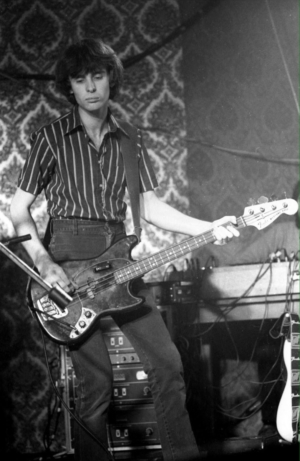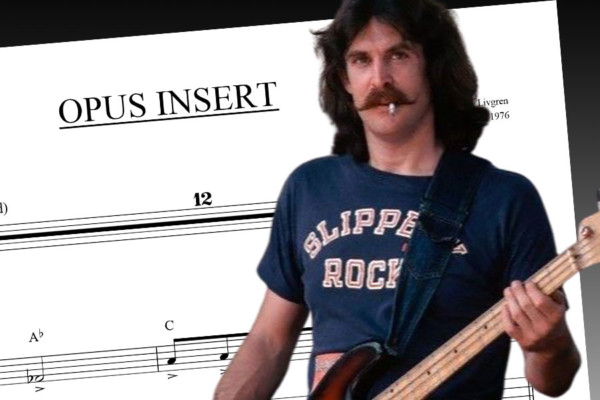Bass Transcription: Colin Moulding’s Bass Line on XTC’s “Senses Working Overtime”
 The three founding members of XTC, bassist Colin Moulding, drummer Terry Chambers and guitarist/vocalist Andy Partridge, initially got together in 1972, calling the band ‘The Helium Kidz’. They took some of their early influence from The New York Dolls and attached themselves to the developing ‘glam rock’ scene that was popular in the UK at the time. When guitarist/keyboardist Barry Andrews joined the band in 1976, they became ‘XTC’, and were signed by Virgin records in 1977, around the time of the rise of punk rock in the UK. As their song-writing developed, the band created more experimental material, with imaginative structures and enigmatic lyrics, but these often contained sing-a-long choruses and catchy hooks. By the time their first album was released, punk had been overtaken by ‘New Wave’, and bands began to shake off punk’s simplicity to create more interesting and varied music, and this possibly enabled XTC’s brand of quirky pop to be appreciated by more mainstream listeners.
The three founding members of XTC, bassist Colin Moulding, drummer Terry Chambers and guitarist/vocalist Andy Partridge, initially got together in 1972, calling the band ‘The Helium Kidz’. They took some of their early influence from The New York Dolls and attached themselves to the developing ‘glam rock’ scene that was popular in the UK at the time. When guitarist/keyboardist Barry Andrews joined the band in 1976, they became ‘XTC’, and were signed by Virgin records in 1977, around the time of the rise of punk rock in the UK. As their song-writing developed, the band created more experimental material, with imaginative structures and enigmatic lyrics, but these often contained sing-a-long choruses and catchy hooks. By the time their first album was released, punk had been overtaken by ‘New Wave’, and bands began to shake off punk’s simplicity to create more interesting and varied music, and this possibly enabled XTC’s brand of quirky pop to be appreciated by more mainstream listeners.
The band’s first album “White Music” quickly gained positive critical reviews, but they didn’t have major chart success until “Making Plans For Nigel” was released as a single from their third album “Drums and Wires” in 1979. Further albums consolidated their position as critics favorites, and there was some further success in the singles chart with “Sgt Rock” (1980) and “Senses Working Overtime” (1982). Hits in Australia and a US tour supporting (amongst others) The Police and The Cars helped to establish them outside the UK, but Andy Partridge’s debilitating stage fright meant that the band ceased gigging in April 1982. This led to the departure of original drummer Terry Chambers, but they continued to write and record, and develop a wider range of compositional and arranging techniques. Keyboardist Dave Gregory also left by the late 90s, and Moulding and Partridge ceased working as ‘XTC’ in 2006, although Partridge has recorded new material.
Moulding chose to play bass because “I thought that playing a bass, with four strings, would be infinitely easier than playing a guitar, with six strings. That was a horrible misconception!”. He cites Andy Fraser, Bill Wyman and Chris Squire as influences on his playing, and the work of Jethro Tull as a reason for his interest in music. He has used instruments from a variety of manufacturers, including Epiphone, Fender, Wal, Rickenbacker, and Ibanez, and used a range of amplification including Ampeg and Trace Elliott.
The bass-line for “Senses Working Overtime” begins after a four-bar intro and one cycle of the verse chords. The song seems to begin in F# major, although the harmony is rather ambiguous here, as the chords played by Andy Partridge are incomplete. At the bass entry at bar 13, Moulding adds to the unsettling feel by initially avoiding playing on the first beat of the bar, and only briefly playing the root note of the A#m7b9 chord, sliding down to include the seventh. He also avoids the root note of the G#m chord in bar 14, choosing to slide up to the fifth instead. At bar 21, there is a key change into E major and a more straightforward IV to V repetition where Moulding simplifies his line to simple root quavers.
The bass-line in the chorus begins with a strong descending line in crotchets, and then a straightforward dotted crotchet/quaver root note line that lasts until the end of the section where Moulding turns the first chorus idea around and then finishes off with a reverse triad of B major. The verse and chorus are repeated, and at bar 85, there is a key change into D major for the middle section. Moulding uses an effective repeating idea here and includes double stops and slides to weave around the chords. At bar 99 there is another change of feel and the bass-line moves to quavers to create more intensity, using root and seventh idea over the I – V changes in D and Bb. A final bar of C leads into a repeat of the pre-chorus and chorus, but this time in F major. This key change is barely noticeable due to the ambiguity of the previous section.
Download the transcription and follow along with the video below. Note: This transcription of “Senses Working Overtime” by XTC is the single version.


